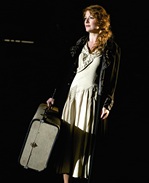SITE GUIDE
SEARCH
REVIEWS
REVIEW ARCHIVES
ADVERTISING AT CURTAINUP
FEATURES
NEWS
Etcetera and
Short Term Listings
LISTINGS
Broadway
Off-Broadway
NYC Restaurants
BOOKS and CDs
OTHER PLACES
Berkshires
London
California
New Jersey
DC
Connecticut
Philadelphia
Elsewhere
QUOTES
TKTS
PLAYWRIGHTS' ALBUMS
LETTERS TO EDITOR
FILM
LINKS
MISCELLANEOUS
Free Updates
Masthead
Writing for Us
A CurtainUp  London Review
London Review
 London Review
London ReviewMack and Mabel
by Sebastian King
|
"What are you gonna do five years from now when they're tired of talkies, what are you gonna give 'em then? Colours? Or a new sized screen? Or bare butts and dirty words? Go on try all the tricks you can think of, it's still not gonna be worth one reel of Birth of a Nation, not one frame of Chaplin, not one eighth of a quarter of an inch of my Mabel." — Mack
|

Laura Pitt-Pulford as Mabel (Photo: Annabel Vere) |
The story of Mabel Normand (Laura Pitt-Pulford), whose ascent from New York waitress to comic star of silent movies, having been taken under the wing of legendary director Mack Sennett (Norman Bowman), is the stuff of Hollywood legend. Her complex romantic entanglement with Mack, along with his refusal to alter his once-successful film-making formula, led to Mabel’s increasing dependency on alcohol and drugs, and she died from tuberculosis at the age of 37. Herman and book writer Michael Stewart play fast-and-loose with the facts, but their resulting show is at its heart a tragic love story and love-letter to the Golden Age of Hollywood.
Thanks to Jason Denvir’s design and Howard Hudson’s creative lighting, Southwark Playhouse’s Vault has been converted into a believable and atmospheric Hollywood film studio. Sound Designer Andrew Johnson has also solved the sound balance issues that have hindered productions in this space previously, by housing the ten-piece band off-stage. It’s a shame not to see them in action, but it’s a small price to pay for West End quality sound balance and clarity.
In fact there is nothing about this production that is not ‘West End quality’. The cast sing, dance and act flawlessly, with standout supporting performances from the beautifully-voiced Stuart Matthew Price as Frank, and Jessica Martin as Lottie Ames. Martin, who took over from Caroline O’ Connor as Mabel in the show’s original West End production leads the stonking Act II tap-routine ‘Tap Your Troubles Away’. As the dictatorial Mack, Norman Bowman finds shades of humanity and a certain amount of dashing charm, his warm baritone soaring through the anti- love song ‘I Won’t Send Roses’, and final ballad ‘Happy Ending’.
Gifted with the best songs, it is Laura Pitt-Pulford as the feisty but flawed Mabel who really shines. Her punchy opening number ‘Look What Happened to Mabel’ is delivered with a mischievous spark whilst she ends Act 1 with grim determination to be ‘Wherever He Ain’t’, belting out the defiant number from the top of a staircase-on-wheels. The staircase makes another appearance as she performs one of the best written torch songs of all time ‘Time Heals Everything’ with a heart-breaking desperation.
In the programme notes, Southerland writes that this production is something of a labour of love, and this comes across in his staging, which is full of creativity and subtlety. I particularly enjoyed the film sequences imaginatively choreographed by Lee Proud: when Mack is directing, he and the camera are always centre stage, with the actors confined to the corners, but when Frank takes over as director, he places the actors centre stage and moves downstage. It’s a nice touch, which seems to reflect Southerland’s own intention to present a show that he loves in the best possible light. With this pitch-perfect production, there is no doubt that he has most definitely succeeded.
|
Subscribe to our FREE email updates with a note from editor Elyse Sommer about additions to the website -- with main page hot links to the latest features posted at our numerous locations. To subscribe,
E-mail: esommer@curtainup.comesommer@curtainup.com
put SUBSCRIBE CURTAINUP EMAIL UPDATE in the subject line and your full name and email address in the body of the message -- if you can spare a minute, tell us how you came to CurtainUp and from what part of the country. |
| Mack and Mabel
Music and Lyrics by Jerry Herman Book by Michael Stewart, revised by Francine Pascal Directed by Thom Southerland Starring: Norman Bowman, Laura Pitt-Pulford, Jessica Martin, Stuart Matthew Price, Steven Serlin With: Richard J Hunt, Jody Ellen Robinson, Anthony Wise, Peter Kenworthy, Jessica Buckby, Ryan Gover, Paul Hutton, Natalie Kent, Jonathan Norman, Nikki Schofield Designed by Jason Denvir Lighting: Howard Hudson Musical Supervisor: Iain Vince-Gatt Musical Director: Michael Bradley Sound Designer: Andrew Johnson Choreography: Lee Proud Running time: 2 hours 45 minutes including interval Box Office: 0207 407 0234 Booking to 25th August 2012 Reviewed by Sebastian King based on 11th July performance at The Vault, Southwark Playhouse, Shipwright Yard, Tooley Street, SE1 2TF (Tube: London Bridge) REVIEW FEEDBACK Highlight one of the responses below and click "copy" or"CTRL+C"
Paste the highlighted text into the subject line (CTRL+ V): Feel free to add detailed comments in the body of the email . . . also the names and emails of any friends to whom you'd like us to forward a copy of this review. |




